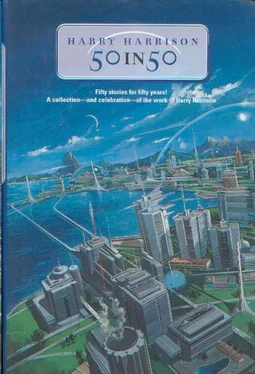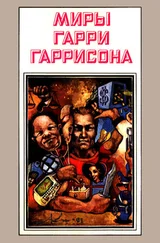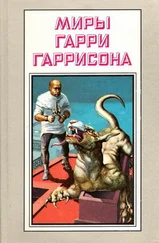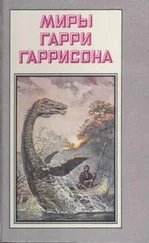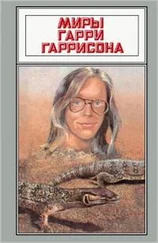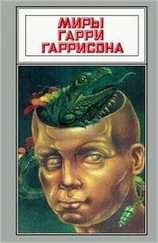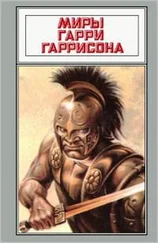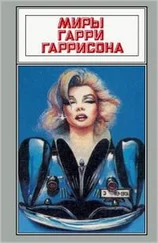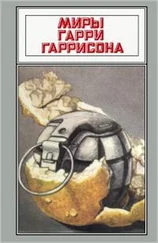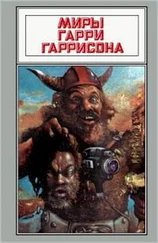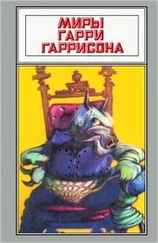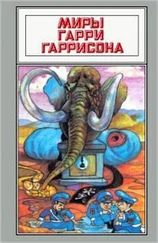Гарри Гаррисон - 50 in 50
Здесь есть возможность читать онлайн «Гарри Гаррисон - 50 in 50» весь текст электронной книги совершенно бесплатно (целиком полную версию без сокращений). В некоторых случаях можно слушать аудио, скачать через торрент в формате fb2 и присутствует краткое содержание. Жанр: Фантастика и фэнтези, на английском языке. Описание произведения, (предисловие) а так же отзывы посетителей доступны на портале библиотеки ЛибКат.
- Название:50 in 50
- Автор:
- Жанр:
- Год:неизвестен
- ISBN:нет данных
- Рейтинг книги:5 / 5. Голосов: 1
-
Избранное:Добавить в избранное
- Отзывы:
-
Ваша оценка:
- 100
- 1
- 2
- 3
- 4
- 5
50 in 50: краткое содержание, описание и аннотация
Предлагаем к чтению аннотацию, описание, краткое содержание или предисловие (зависит от того, что написал сам автор книги «50 in 50»). Если вы не нашли необходимую информацию о книге — напишите в комментариях, мы постараемся отыскать её.
50 in 50 — читать онлайн бесплатно полную книгу (весь текст) целиком
Ниже представлен текст книги, разбитый по страницам. Система сохранения места последней прочитанной страницы, позволяет с удобством читать онлайн бесплатно книгу «50 in 50», без необходимости каждый раз заново искать на чём Вы остановились. Поставьте закладку, и сможете в любой момент перейти на страницу, на которой закончили чтение.
Интервал:
Закладка:
Akotolp was correct; Essokel and the burdens her fargi carried brought civilization and great happiness back to the city. Hesotsan for hunting, the pleasure of sweet warm meat for all. There were many cloaks in the bundles, for the expedition had been through the mountain passes where the air was chill. They were needed now: the nights were growing colder, and these flat brainless cloak-creatures if kept well fed had high body temperatures. All the city leaders had cloaks and slept well. The fargi did not and could only huddle together at night, draw warmth from one another and shudder in silence.
But the pleasure could not last. Even the stupidest fargi, fresh from the sea and unable to talk, could see that the nights were growing colder, days as well. The fish were no longer as plentiful as they had been. The clouds did not part, the sun did not shine, the plants were dying. The animals they ate were leaner and tougher as the grazing grew harder. Still they ate very well, for the enzyme vats were kept filled with meat. Which was a very bad sign indeed, for they were not being killed — they were dying. This was the time when the Eistaa summoned the two scientists to join her in the ambesed where she waited with Velikrei.
"Listen to what this hunter tells me," the Eistaa said, darkness in her speech.
"The onetsensast that they butcher now, that goes into the meat vats. It is the last one. All others — dead, the fields empty."
"What is happening — what is going to happen?" the Eistaa asked. "You are Yilane of science, you must know."
"We know," Akotolp said, fighting to keep calmness in her words and motions. "We will tell you, Eistaa." The hunter did not see her quick motion of pointing and dismissal.
"You have brought the information, Velikrei. Return to your forest."
Akotolp waited until the three of them were alone before she spoke. Now she made no attempt to keep the dread and despair from her speech.
"It is the sun that brings us life, Eistaa. If the sun does not shine we die. The clouds kill us."
"I see wiai is happening — yet I do not understand."
"There is a chain of life," Essokel said. "It starts in the cells of the plants, where the sun's rays are turned into food. The fish and the ustuzou eat them and live. We in turn eat their flesh — and we live." She leaned down and pulled a clump of yellowed grass from the ground and held it out. "This dies, they die, we die."
The Eistaa looked at the grass, immobile, her muscles locked hard as the thought echoed again and again in her brain. In the end she turned J;o Akotolp and signed a short query.
"True?"
"Inescapable truth."
"Can we not fill the vats, store food, wait until the clouds open up and the sun shines again?"
"We can — and we will. Seed will be stored as well, to plant and regrow when the sun returns."
"This will be done. I will order it. When will the sun return?"
The response to this question was only silence. The Eistaa waited, her anger growing, until she could control it no longer.
"Speak, Akotolp! I order you to speak! When will the sun return?"
"I — we — do not know, Eistaa. And unless it returns soon the world as we know it is dead. Species once destroyed do not return. We are one of those species. We are important only to ourselves. In the totality of biology we are as important — or unimportant — as that clump of grass. It is of no help to us to know that even if the clouds remain forever life will go on. But it will not be the world we know. There exist life forms that are very persistent and can endure a great range of temperatures and environments. We cannot. We will not survive on this world unless things remain very much as they always were. I fear, Essokel and I have discussed this many times that we have already passed the time of survival…"
"That is not true! Yilane live."
"Yilane die," Essokel said with grim movements. "Fargi die already of cold. We have examined them."
"We have cloaks."
"The cloaks will die as well. It is already too cold for them to breed." There was a great feeling of despair in Akotolp's shuddered movements. "I fear that all will be ended, all Yilane dead, everything we are, everything that we have done, vanished. It will be as if we have never been. When the clouds break, if they ever break, it will be the ustuzou who will live."
"What? These vermin-crawling filthy things underfoot? Your speaking is an insult!"
As though in further insult an ustuzou scuttled through the dead grass close by, paused an instant to glance at them with tiny dark eyes, scratched quick claws through its fur. The Eistaa stamped out with her foot but crushed only dead stems as the creature vanished from sight.
"You say that these vile things will live — why?"
"Because of their nature," Essokel explained patiently. "All complex creatures require regularizing of body temperature, they are all warm-blooded. But there are two ways of staying warm. We Yilane are exothermic, which means we must live in a warm climate and take in heat from outside. This is very efficient. The ustuzou are very inefficient since they are endothermic, which means they must eat all of the time and turn their food into heat…"
"You speak like this only to confuse me — all this talk of hot or cold, inside and out."
"You must excuse my inefficiency-stupidity, Eistaa. I simplify. We will get cold, we will die. That small ustuzou will not get cold. When the air cools it will eat more. It will eat dead plants, dead bodies — it will eat our dead bodies. The corpses of our world will nourish these creatures for a long time. Perhaps until the clouds disperse and the sun returns. If this comes to pass then it will be an ustuzou world and the Yilane will not even be a memory. It will be as though we never were—"
"A thought I will not have!" the Eistaa roared with anger, tearing at the ground with her claws. "Leave me! Be silent in my presence hereafter. I will not hear these words again."
The scientists left, a cold rain fell, night descended. There was the movement of tiny, furry creatures through the grass and into the dead forest beyond. Tiny creatures that ate seeds, stems, bones, marrow, flesh, grass, insects — anything.
Warm-blooded animals that could survive when ninety percent of all other creatures died.
Survive and evolve for sixty million years. Whose descendants read these words.
An Honest Day's Work
"I do my job, that's all. And that's all that anyone can expect." Jerry's jaw set hard with these words, set as firmly as his voice as he bit deep into the scarred stem of the old pipe.
"I know that, Mr. Cruncher," the Lieutenant said. "No one is asking you to do anything more than that, or to do anything wrong." He was dusty and one of the pocket flaps had been torn off his uniform. There was a wild look in his eye and he had a tendency to talk too fast. "We tracked you down through BuRecCent and it wasn't easy, there were good men lost…" His voice started to rise and he drew himself up with an effort. "We would like your cooperation if we could get it."
"Not the sort of thing I like to do. It could lead to trouble."
The trouble was that no one had expected events to happen as they did. Or rather the people who expected it had expected something altogether different. They had made their plans accordingly and fed them to the computer which had drawn up programs covering all possible variations of the original. However the Betelgeuseans had a completely different plan in mind so they therefore succeeded far beyond what was possibly their own wildest dreams. The trade station they had set up in Tycho crater on the moon was just that, a trade station, and had nothing to do at all with the events that followed.
Records of the Disaster are confused, as well they might be under the circumstances, and the number of aliens involved in the first phase of the invasion was certainly only a fraction of the exaggerated figures that were being tossed around by excited newsmen, or worried military personnel who felt that there must be that number of attacking aliens to wreak the damage that was done. The chances are that there were no more than two, three maximum, ships involved; a few hundred Betelgeuseans at the most. A few hundred to subjugate an entire planet — and they came within a hair of succeeding.
Читать дальшеИнтервал:
Закладка:
Похожие книги на «50 in 50»
Представляем Вашему вниманию похожие книги на «50 in 50» списком для выбора. Мы отобрали схожую по названию и смыслу литературу в надежде предоставить читателям больше вариантов отыскать новые, интересные, ещё непрочитанные произведения.
Обсуждение, отзывы о книге «50 in 50» и просто собственные мнения читателей. Оставьте ваши комментарии, напишите, что Вы думаете о произведении, его смысле или главных героях. Укажите что конкретно понравилось, а что нет, и почему Вы так считаете.
